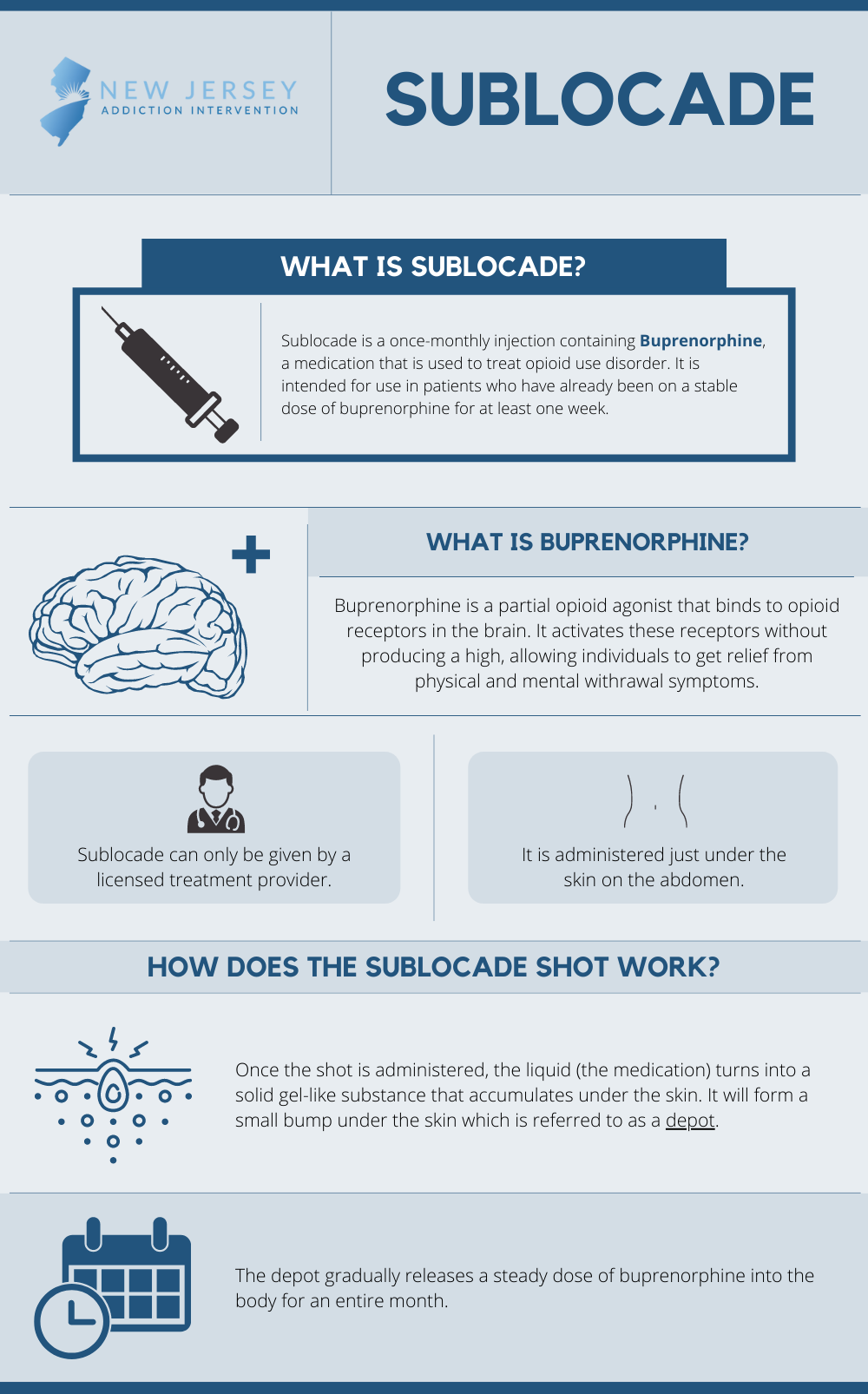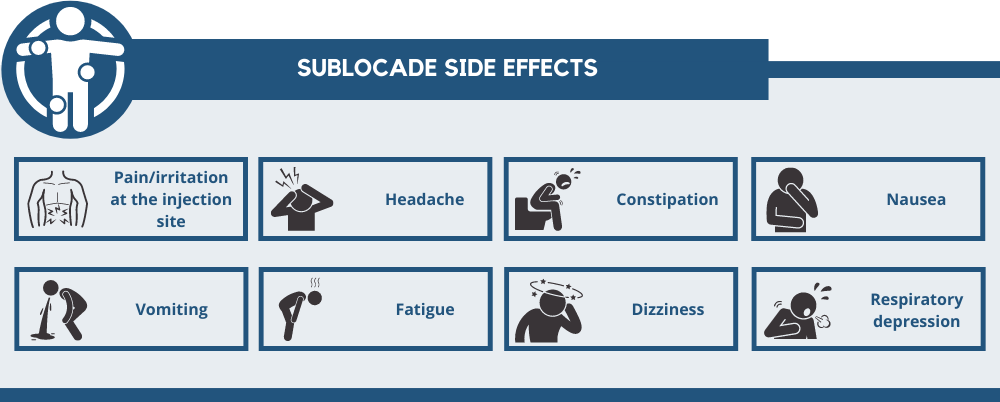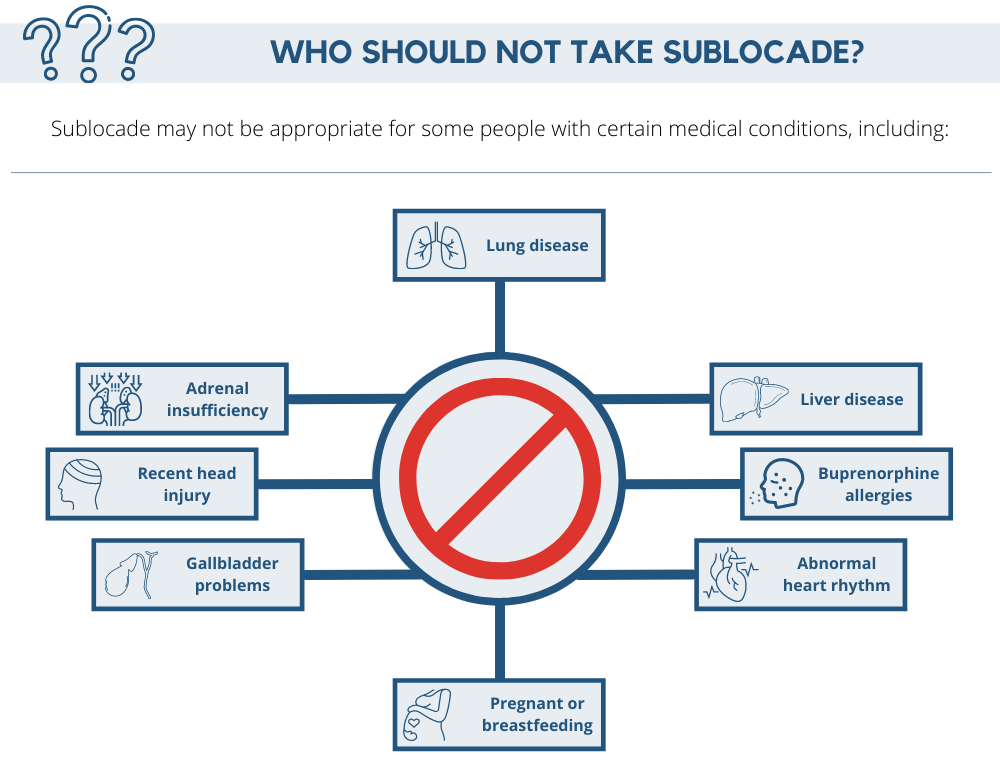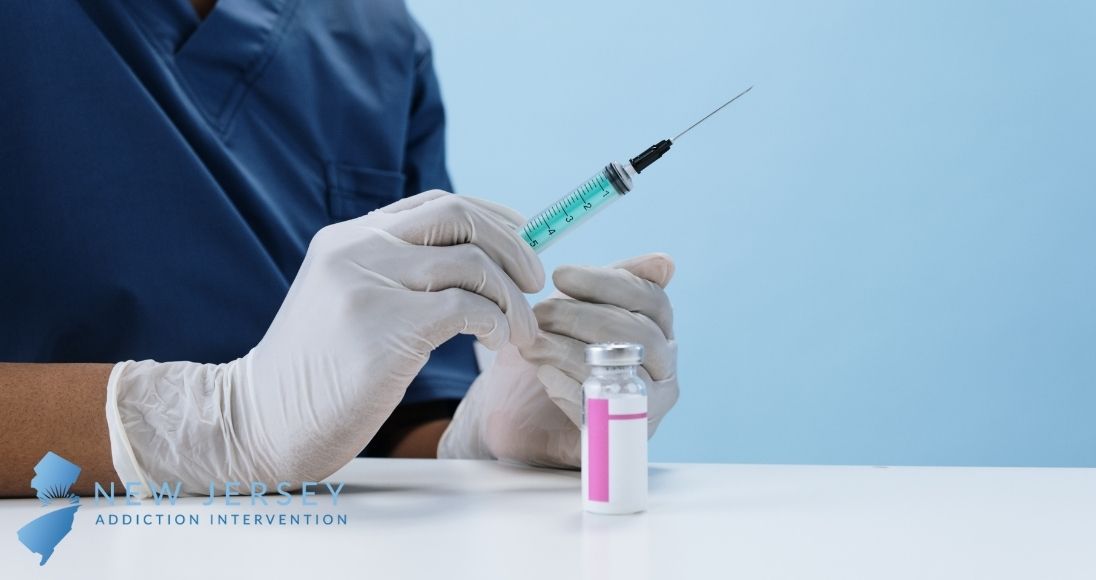Opioid treatment medications are highly effective at treating opioid addiction and can significantly improve a person’s ability to stay sober. Unfortunately, many treatment medications have the potential for misuse and addiction–an issue that can end up exacerbating the cycle of addiction. The good news is there are newer alternatives, like Sublocade, that are just as effective, but not as dangerous. Here is what patients can expect during Sublocade treatment in New Jersey.
What is Sublocade?
Sublocade is the first once-monthly injection of buprenorphine that is used to treat moderate-to-severe opioid use disorder. The U.S. Food and Drug Administration (FDA) approved the medication in 2017 for treatment in adult patients who have already begun treatment with a daily, transmucosal buprenorphine product.[1]
Buprenorphine, the medication in Sublocade, is a partial opioid agonist-antagonist. It binds to opioid receptors in the brain and partially activates them while blocking the effects of other more addictive opioids. In other words, it produces some of the same effects as other opioids but doesn’t produce the same high. Buprenorphine is used to treat opioid use disorder because it can alleviate opioid withdrawal symptoms and cravings.[2]
Other buprenorphine products, such as Subutex and Suboxone, must be taken on a daily basis. They also carry a risk of abuse and dependence. This poses challenges when it comes to medication adherence and misuse. Sublocade, however, is an injection that is only administered in an office by a licensed medical professional. As a result, there is no risk of abuse or addiction, and it reduces the burden of having to take medication daily as prescribed.

How Does the Sublocade Shot Work?
Sublocade treatment is intended for use in patients who have already been on a steady dose of buprenorphine for at least seven days.[3] Patients in New Jersey are usually prescribed Suboxone (buprenorphine and naloxone) or Subutex (buprenorphine) during the first week of their sobriety if they are planning on taking the Sublocade shot.
Sublocade is a subcutaneous liquid injection which means it is administered just below the skin. Providers usually administer it in the abdomen. Once the liquid enters the area below the skin, it turns into a solid gel that is referred to as a depot (dee-poh). The depot slowly releases a steady dose of buprenorphine in the body all month long. As the medication is released from the depot, the gel deposit will get smaller and smaller.
When the medication circulates throughout the body, it attaches to opioid receptors in the brain and blocks the rewarding effects of other opioids. It also alleviates drug cravings, allowing individuals to place all of their focus and energy on their treatment program.
Sublocade Side Effects and Precautions


Sublocade may cause mild to moderate side effects. The most common side effects include injection site reactions such as pain, itching, swelling, redness, or irritation at the injection site. These reactions are usually minor and subside within a couple of days or weeks.
Other common side effects patients may experience during Sublocade treatment in New Jersey include:[3]
- Headache
- Constipation
- Nausea
- Vomiting
- Fatigue
- Dizziness
- Respiratory depression
Sublocade may not be appropriate for some people with certain medical conditions, including:
- Lung disease
- Adrenal insufficiency
- Liver disease
- Recent head injury
- Buprenorphine allergies
- Gallbladder problems
- Abnormal heart rhythm
- Pregnant or breastfeeding
Sublocade is a Schedule III controlled substance which means it has the potential for physical and psychological dependence. However, misuse of the drug via injection can be dangerous and even life-threatening because the medication turns into a solid once it enters the body. This means improper injection techniques can lead to tissue damage, poor blood flow, and even death.
Fortunately, the potential for misuse and diversion is minimized using the Risk Evaluation and Mitigation Strategy Program (REMS). Under REMS, the injection is only supplied to REMS-certified pharmacies and healthcare professionals. It is also only administered in a healthcare setting that is certified by the REMS program.[4]
What to Expect During Sublocade Treatment in New Jersey
Sublocade is used in many medication-assisted treatment (MAT) programs in New Jersey to treat opioid addiction. MAT is an approach that combines FDA-approved treatment medications with counseling, behavioral therapy, and peer support to provide a whole-patient approach to treatment. By combining Sublocade with a comprehensive treatment program, patients can get relief from distracting, troublesome cravings while they focus on their recovery journey. This approach can improve treatment retention rates and reduce the risk of relapse after treatment.[5]
Throughout Sublocade treatment, patients have regular doctor’s exams where they can get help with side effects, dosing, and more. Patients may attend an inpatient or outpatient program based on their individual needs. When an individual is ready to stop taking Sublocade, they will work with their doctor to slowly taper off of buprenorphine without going into withdrawal.
Find a Sublocade Treatment Program in New Jersey Today
If you or a loved one are addicted to opioids, a Sublocade treatment program in New Jersey may be able to help. Speak to one of our trusted addiction specialists today to find a MAT clinic near you.
References:
- https://www.fda.gov/news-events/press-announcements/fda-approves-first-once-monthly-buprenorphine-injection-medication-assisted-treatment-option-opioid
- https://www.samhsa.gov/medication-assisted-treatment/medications-counseling-related-conditions/buprenorphine
- https://www.accessdata.fda.gov/drugsatfda_docs/label/2020/209819s012lbl.pdf
- https://www.accessdata.fda.gov/scripts/cder/rems/index.cfm?event=IndvRemsDetails.page&REMS=376
Medically Reviewed: November 9, 2021

All of the information on this page has been reviewed and verified by a certified addiction professional.

